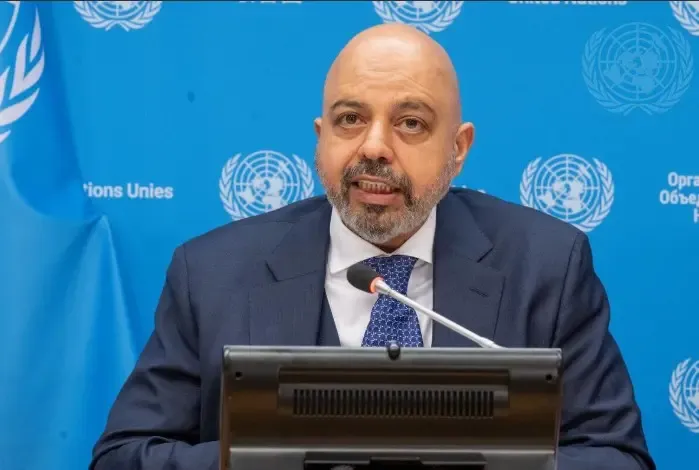India Positioned as a Key Contender for an Expanded UNSC: Reform Negotiation Lead

Synopsis
Key Takeaways
- India is a key player vying for a seat in a reformed UNSC.
- Reform negotiations are led by Tareq M.A.M. AlBanai.
- The UNSC expansion aims to include between 21 and 27 members.
- Consensus among 193 member states is crucial for reform.
- Realistic target for reforms is set for 2030.
United Nations, April 18 (NationPress) India, recognized as a significant player on the global stage, is set to be a strong contender if the UN Security Council's membership expands to between 21 and 27 nations, as stated by the Co-chair of the reform negotiations, Tareq M.A.M. AlBanai.
On Thursday, he remarked, "The objective of this reformed Council must be to ensure it is representative, and clearly, India stands out as a crucial player on the international scene today."
"If the decision is made to expand the council to anywhere from 21 to 27 members, India will undoubtedly be a contender," he emphasized.
However, he noted that this would depend on the decisions made by the wider membership.
AlBanai highlighted that the UN comprises 193 countries, and the aim is to ensure representation for all member states.
He recalled his visit to India last year alongside former Austrian Ambassador Alexander Marschik, who co-chaired the negotiation process, and shared that they had discussions at the highest levels.
As the permanent representative of Kuwait, AlBanai leads the reform process designated as Intergovernmental Negotiations (IGN) and updated the press on the progress made.
Regarding a matter that India has been advocating for—the adoption of a negotiating text for the IGN—he expressed confidence that it would be accepted.
A small coalition of countries known as 'Uniting for Consensus', which includes Pakistan and is spearheaded by Italy, opposes the enlargement of permanent Council membership and hinders the adoption of a negotiating text, thereby delaying reforms indefinitely.
AlBanai remarked, "This process will eventually lead us to text-based negotiations, as that is the simpler aspect of this endeavor."
"The challenging part lies in reaching a consensus on the content of the text, but formalizing it on paper should not be particularly difficult," he stated.
AlBanai did not express optimism regarding a swift completion of the reforms.
"If I were to claim that we can conclude this within a year, I would be misleading you," he cautioned, due to the intricate nature of reforms that will have implications for the next century.
While he suggested that 2030—five years hence—"is a realistic target," he added, "But I cannot assure you it will be achieved by 2030 or any other specific year."
Discussing the obstacles faced in the reform process, he described it as complex and requiring patience, noting that any decisions made could necessitate charter amendments, which is inherently complicated.
"The reform process needs to endure for at least the next century to adapt to the various challenges the United Nations and the world face," he remarked.
"Let’s hope that this process continues to progress positively, as it has over the past few years," he concluded.
He advocated for an open, structured dialogue without "artificial deadlines or barriers" to facilitate consensus on reforms.










